The current online edition of MRZine offers an interesting overview of higher education in America by Harry Targ, professor of Political Science at Purdue University. Targ is a happy triumphalist of the left, who in a celebratory mood, may have spilt more beans than he meant to. But let’s start with the context.
MRZine? MRZine is an enterprise of Monthly Review, an independent voice of socialism in America. According to its website, Monthly Review started out in 1949 in New York City, “as cold war hysteria gathered force in the United States.” It “spoke for socialism and against U.S. imperialism and is still doing so today.” One imagines it has been a lonely sixty years. America as a whole never cottoned to socialism. Monthly Review acknowledges the fact and takes pride in soldiering on:
In the intervening years of counter-revolution, Monthly Review has kept a steady viewpoint. That point of view is the heartfelt attempt to frame the issues of the day with one set of interests foremost in mind: those of the great majority of humankind, the propertyless.
Socialists in America, however, have also had their triumphs, and Monthly Review has played its part: “A generation of activists received no small part of their education from the magazine and readers of Monthly Review Press books.”
What books might those be? The current website offers these six seminal texts:
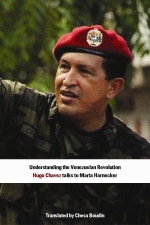
UNDERSTANDING THE VENEZUELAN REVOLUTION: Hugo Chavez Talks to Marta Harnecker
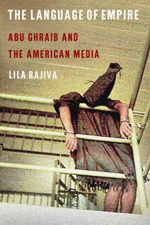
THE LANGUAGE OF EMPIRE: Abu Ghraib and the American Media by Lila Rajiva
READ EXCERPT
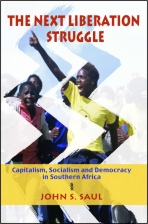
THE NEXT LIBERATION STRUGGLE: Capitalism, Socialism, and Democracy in Southern Africa
by John S. Saul
READ EXCERPT
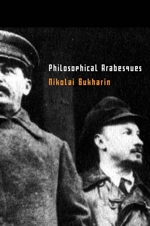
PHILOSOPHICAL ARABESQUES
by Nikolai Bukharin
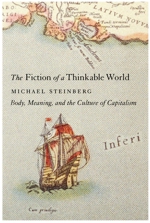
THE FICTION OF A THINKABLE WORLD: Body, Meaning, and the Culture of Capitalism
by Michael Steinberg
READ EXCERPT
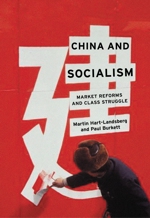
CHINA AND SOCIALISM: Market Reforms and Class Struggle by Martin Hart-Landsberg and Paul Burkett
The Monthly Review Store offers many more. Education at Monthly Review, however, does not stop with vending books that disseminate radical critiques of society. It also offers incisive articles, such as Harry Targ’s “Higher Education Today: Theory and Practice.” Targ’s essay is part-memoir, part manifesto, and in its way is a wonderful exposition of a certain worldview. Targ is the author of several books, including Challenging Late Capitalism, Neoliberal Globalization, and Militarism; Strategy for an Empire in Decline; Cuba and the USA, and People’s Nicaragua.
Targ begins where Monthly Review itself begins. “I am a child of the cold war.” He took in Eisenhower’s warnings about the military-industrial complex; was “modestly inspired” by Kennedy who, he did not realize at the time, “spoke for American empire,” and “drifted into the cognitive orbit of Pete Seeger and the Weavers” during the Civil Rights struggle. Cue Pete.
The early stages of Targ’s educational bildung sound suspiciously un-radical. He studied political science and adopted “the realist” perspective, e.g. “all nations, even our own, were driven by the pursuit of power.” Then in graduate school in the 1960s he came under the influence of “the new ‘behavior science’ revolution,” where he was taught to “describe” political behavior rather than change it. Karl Marx is presumably groaning in the background. No, no, “the point is to change it.” But young Harry is about to have his epiphany. He arrives as a teacher at Purdue University in 1967 and discovers that neither “realism” nor “behavior science” help him to “understand the escalating war in Vietnam.”
At this point the reader who doesn’t entirely share the Monthly Review Weltanschauung might wonder in what ways these theoretical perspectives failed young Harry, but he doesn’t stop to explain. Instead we next see him in the midst of what looks like an existential engagement with texts that he adds to his course on “Contemporary Political Problems”: The Autobiography of Malcolm X, the Port Huron Statement, Camus' The Rebel, C. Wright Mills' The Power Elite, and William Appleman Williams' The Tragedy of American Diplomacy.
Reading the views of disenchanted leftists prompts discussions about “education,” and soon Harry is teaching the books of fashionable counter-cultural edu-reformers: Paul Goodman, Ivan Illich, Jonathan Kozol, Herbert Kohl, Robert Paul Wolf. Again, it is not clear how reading Paul Goodman et al serves Harry as an intellectual advance over “realism” or “behavior science.” But that’s not really the story Harry Targ wants to tell. These books prepare him psychologically for his advance into more radical stuff. Paulo Freire, Henry Giroux, and Paeter McLaren are waiting around the corner. What Growing Up Absurd Goodman and Death at an Early Age Kozol have given the perplexed young Harry is:
a sense of the contradictory character of education, particularly higher education; a conception of how my education had been shaped by the cold war and U.S. empire; how the modern university was "contested terrain," as to ideas and behavior; how "theory and practice" were connected; and, for me, what the obligations of the educator were in the modern world.
This seems rather vague, but it is where the autobiographical Harry leaves off and the radical Professor Targ steps up to the podium. The rest of the article is his analysis of what the university is and what it should be. It turns out that the “realist” still lives in Professor Targ, to the extent that “realism” was never much more than a cynical inclination to think that everyone else is seeking power. In the case of higher education:
institutions of higher education have always been created and shaped by the interests of the ruling classes and elites in the societies in which they exist. This means they serve to reinforce the economic, political, ideological, and cultural interests of those who create them, fund them, and populate them.
This isn’t a view that can withstand much historical analysis. Large numbers of colleges and universities in the United States were founded by visionaries who had modest resources but high ideals. Many of them were sectarian and looked primarily at raising up an educated clergy. Land grant universities came into being as the dream of Vermont Senator Justin Morrill, a farmer who sought to encourage the spread of better agricultural techniques and practical training to serve people who were not of the elite. Historically black colleges and universities did not arise out of the “interests of the ruling classes and elites.”
Surely there is a fragment of truth in Targ’s assertion. Some colleges and universities are interlaced with the interests of ruling classes. But the overall picture of American higher education is that it has been an engine of social mobility for people who are not in the ruling classes and who have slim prospects of getting there. Do these non-elite colleges and universities nonetheless “reinforce the economic, political, ideological, and cultural interests” of the elite? A “false-consciousness” argument is always the handy fall-back position of radicals when the facts of social life fail to conform to the preferred theory. But I see nothing “false” in the consciousness of ordinary people who see some value in the economic and political system of our nation and who share a love of its cultural attainments. American higher education has an uneven record in promoting knowledge in these areas. It is not as though a college degree was ever synonymous with a Hamiltonian grasp of economics, let alone an admiration for robber barons. Or that going to college produced a surplus of statesmen with a fine-tuned understanding of the republic’s political traditions. But to the extent that higher education in America has fostered a combination of wholesome ambition, clarity about the strengths and limits of a market economy, and a commitment to a government of laws and constitutionally protected freedoms, I celebrate the institution. Long may the university “reinforce” what is good in us.
Unfortunately, it does that less and less, thanks in no small part to the success of those theorists that Targ finds so profound. He cites several scholars as adding to the “analysis” of the university as serving “the needs of rising industrial capitalism in Europe and North America.” (He mentions Robert Paul Wolff, James A. Berlin, and David N. Smith.) This is to tug the thread of truth into an unrecognizable design. Undeniably, American universities in the late 19th and early 20th centuries sought to make themselves useful in building the prosperity of the nation. They did this in part by developing programs aimed at helping immigrants and industrial workers attain education. The YMCA, for example, founded a number of universities with “cooperative” education programs that interwove paid employment with classroom instruction. Northeastern University in Boston is among the cohort of institutions founded in this manner.
But the temptation to carry this connection between economic development and higher education too far is a temptation Targ cannot resist. He mentions, for example, that the emergence of academic departments was part of the capitalist conspiracy to re-jigger the university for its own purposes. The rise of departmental organization was a matter of “compartmentalizing knowledge so it can be fashioned for use in research and development, human relations, making the modern corporation more efficient, developing communications and accounting skills, and developing good citizens.” Really? It had nothing to do with substantial difference in the objects of study, the techniques of investigation, and the separate paths of intellectual development that at the time made biology a field that differed in important ways from chemistry? Or the study of classical languages from inquiry into philosophy?
Targ’s essay has a great deal of this glib fashioning of just-so stories. I don’t get the sense that he is deliberately weaving a fantastic tale. He seems quite devout in his belief that radical theorists of various sorts of unmasked the dark capitalist heart beating in the breast of Western imperialism. But this is not his only point. The left, having gained ascendancy in the contemporary university, would be tying itself in knots to denounce the institution as a mere puppet of the capitalist oppressors. Thus the essay turns on that other favorite idea of Marxists: “contradiction.” The university according to Targ is indeed “diabolical” in being shaped by and serving “the dominant economic and political interests in society.” But it is also—here comes the “contradiction”—a place where “professors could reflect critically on their society and develop knowledge that could be productively used by society to solve human puzzles and problems.”
The “free-thinking scholar” within the university was never totally secure, but could make the university into “contested terrain,” by joining with others to “raise their voices in protest.” Targ, I suppose, must be forgiven for not noticing that these “free-thinking scholars” ended up imposing their own regime of intellectual conformity, intimidation, exclusion of dissenters, and stifling hypocrisy. The educational theorists who became his lodestar had no way to conceptualize this totalitarian side of their program. So it is simply left out of Targ’s analysis.
Well, perhaps not entirely. He takes notice of David Horowitz and his campaign “to purify academia” of those who challenge “the ruling elite.” He mentions the American Council of Trustees and Alumni which “actively supports policing the classroom.” He notices the sad fate of Ward Churchill, and other victims of “the latest red scare against higher education.” His caricatures of the critics of the campus left are a back-handed acknowledgement that the campus is indeed dominated by the left. But it is of course a perilous reign. The “new red scare” has “created an environment of intellectual caution in the academy.”
The “new red scare” seems to me entirely a precious dream of leftist professors. The American public has so far shown no particular interest in the radical posturings of academics. Ward Churchill after all won his case when it was put before a jury. His enunciation of radical views served him as a shield against the consequences of misrepresented credentials and documented history of academic dishonesty. I guess we just make red scares the way we used to.
Targ ends up in that now familiar conceit of the campus left, in which intellectual clarity, transparency, the struggle for interested knowledge, and the pursuit of truth must be set aside in favor of a higher purpose. “Being fair, balanced, and objective is not enough to meet the needs of building a democratic space.”
A “democratic space?” That appears to be the latest euphemism for a campus in which leftist ideologues can exclude their opponents and silence their critics without fear of consequence. In Targ’s kinder telling, it is where “educators…engage students in reflection about the pursuit of peace in this violent world, and the striving for social and economic justice and against racism, sexism, and economic inequality.” The democratic space does away with anything like traditional academic standards because it needs “different ‘validation principles.’” Out with “the crude celebration-of-America approach,” and in with “colleagues who judge the quotients of different points of view and/or the distance of the research and teaching from a point of view.” That’s a nice touch, and worth remembering. Deviation from leftist orthodoxy is to be evaluated as “distance…from a point of view.”
Is Professor Harry Targ, aged 69, typical of the contemporary American university, the field of political science, or anything but the fringes of the American political spectrum? Hard to know. I don’t nominate him as typical but as what Emerson called a “representative man.” He captures the spirit of his age and place in the world. His essay articulates a view of things that some portion of the liberal arts faculty would wholeheartedly endorse and many more would give vague assent as more right than wrong. It ought to be more widely read than it probably will be. It is a testament by a run-of-the-mill academic of a mind and a career that never rose higher than endorsing the platitudes of the American left’s unhappiness with society and culture.
Targ presented his essay first as a public lecture at the departments of philosophy and political science at the University of Tennessee at Chattanooga on the memorable date of April 1, 2008.













